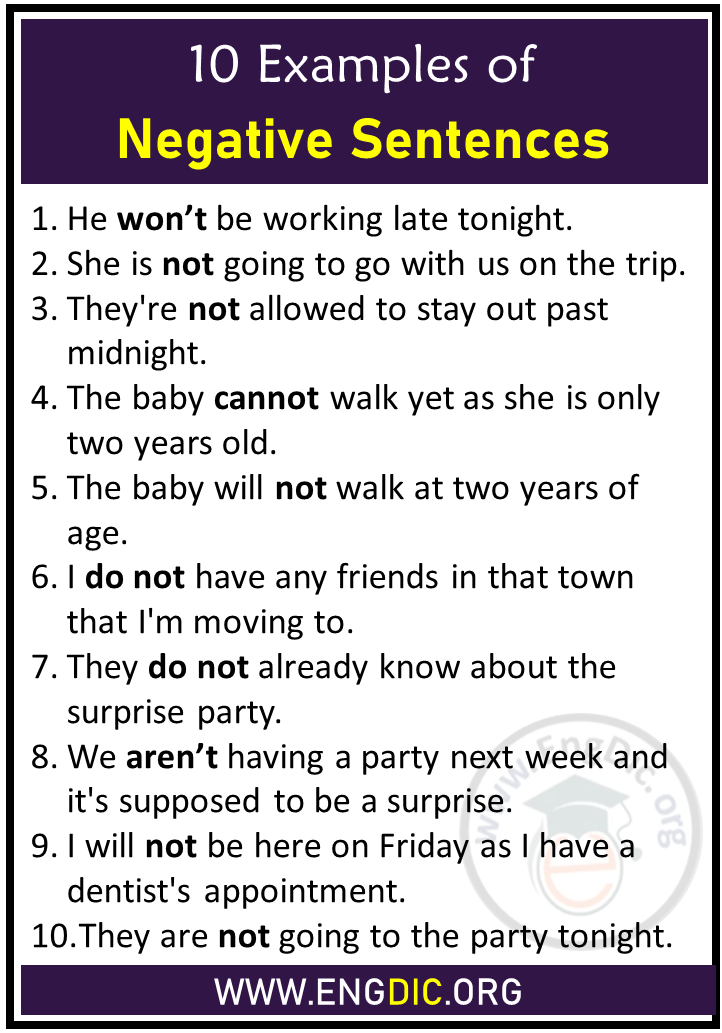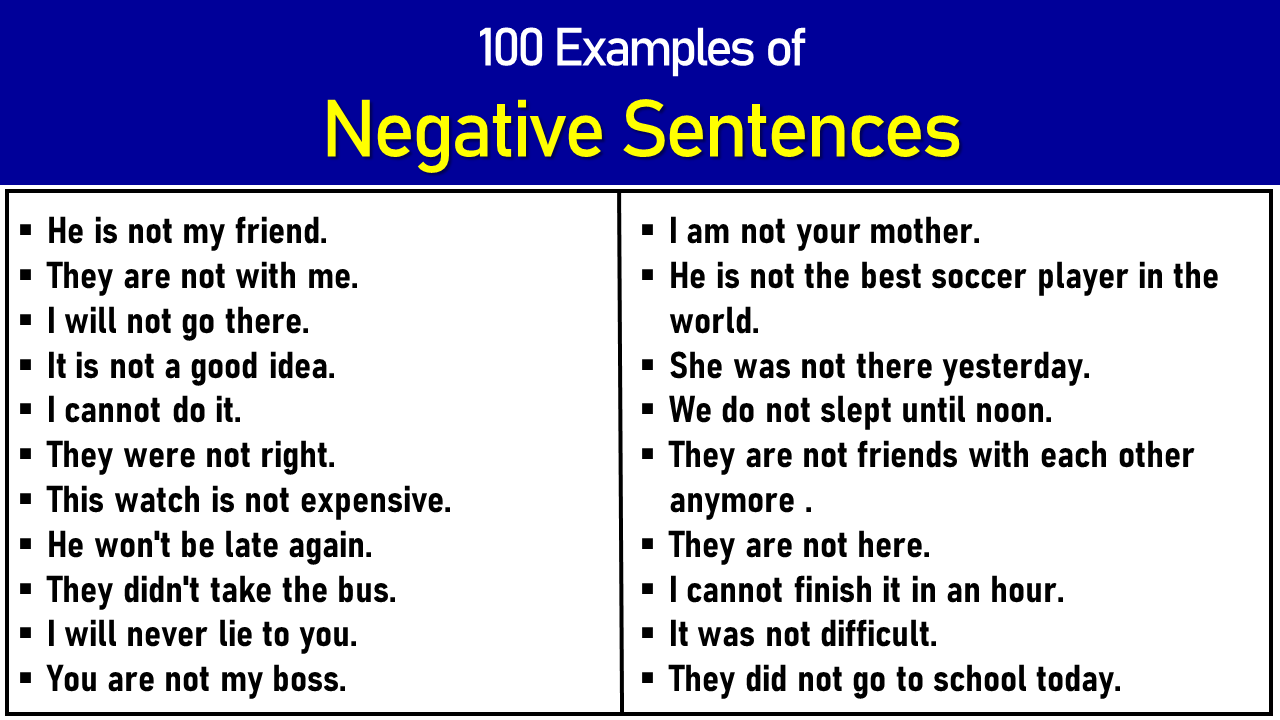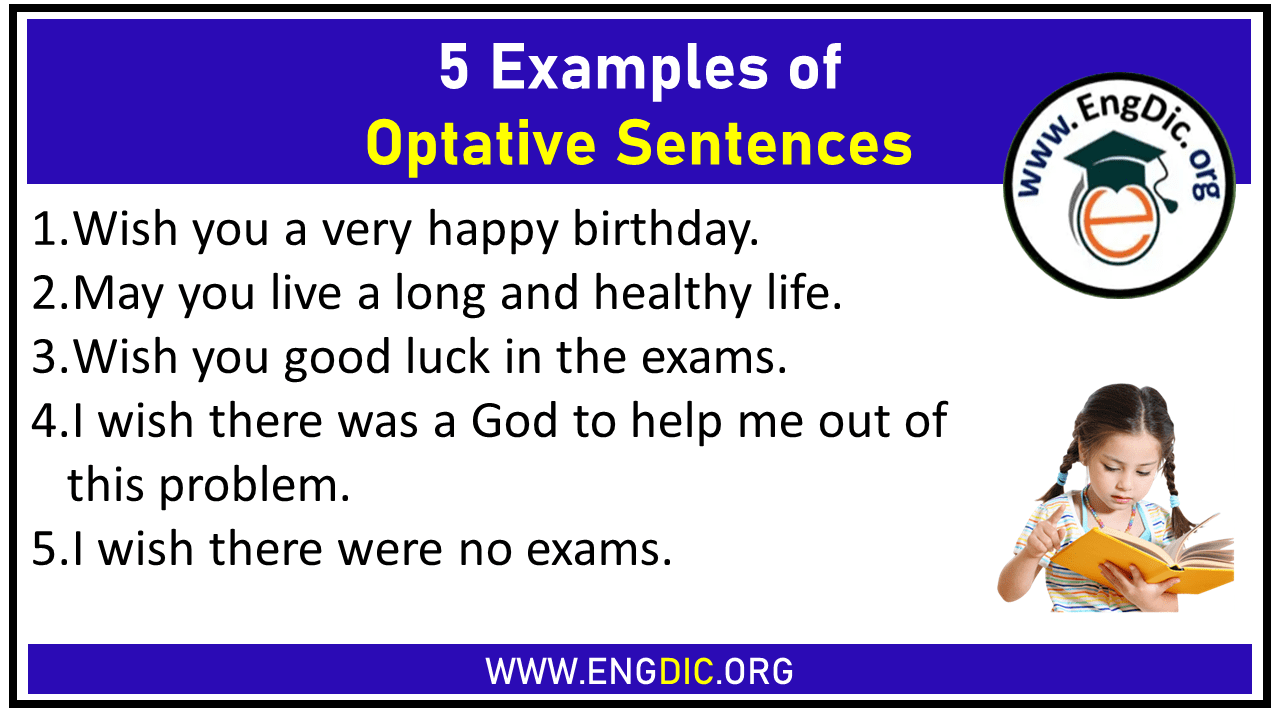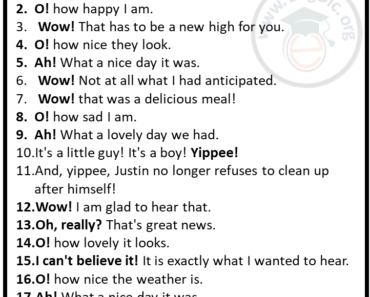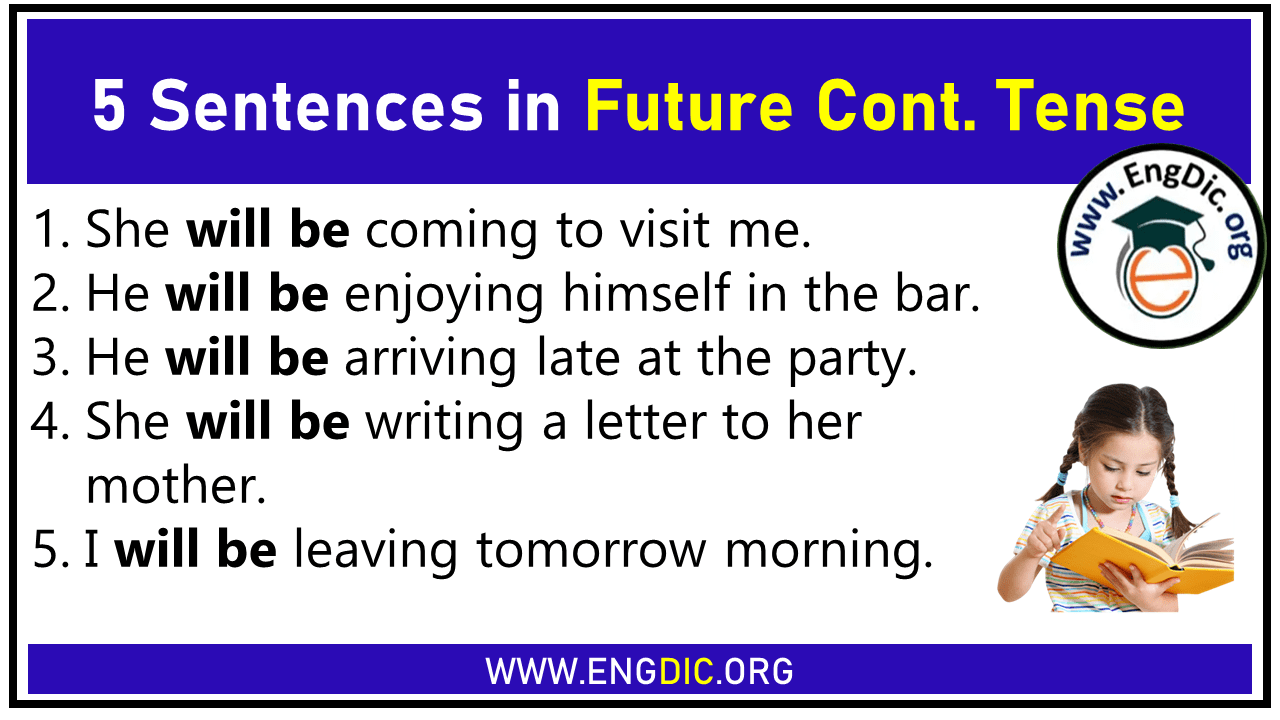Negative sentences can be tricky to master, but they are an essential part of any language. This article offers 100 examples of negative sentences for readers to use as a reference and for inspiration. The sentences range from simple, single-word statements all the way up to longer, more complex sentences. All of the examples provided in this article demonstrate how easy it is to form negative sentences in English.
What is a Negative Sentence?
A negative sentence is a type of sentence that expresses the opposite of a positive statement. It usually contains a negative word, such as “not,” “no,” “never,” “none,” or “neither,” which negates or denies the meaning of the sentence.
For example, “I do not like ice cream” is a negative sentence that means the opposite of “I like ice cream,” which is a positive statement. Negative sentences are commonly used in the English language to express dissatisfaction, or disagreement, or to negate a positive statement.
Types of Negative Sentences
There are different types of negative sentences in English. Here are some examples:
- Negation using “not”:
- I do not like coffee.
- He is not going to the party tonight.
- Negation using “never”:
- She never eats meat.
- They never go to the beach.
- Negation using “no”:
- There is no milk in the fridge.
- I have no idea what he’s talking about.
- Negation using “nobody” or “none”:
- Nobody knows the answer to that question.
- None of the students passed the exam.
- Negation using “neither…nor”:
- Neither John nor Mary likes sushi.
- I neither saw nor heard anything.
- Negation using “hardly…when” or “scarcely…when”:
- Hardly had I started working when the phone rang.
- Scarcely had we arrived at the hotel when it started raining.
- Negation using “not only…but also”:
- She is not only beautiful but also smart.
- They not only finished the project on time but also exceeded expectations.
- Negation using “nevertheless” or “nonetheless”:
- I don’t like her, nevertheless, I have to work with her.
- The weather is terrible, nonetheless, we are going out for a walk.
- Negation using “cannot” or “can’t”:
- I can’t swim.
- We cannot go to the concert tonight.
- Negation using “don’t have” or “doesn’t have”:
- I don’t have a car.
- He doesn’t have any siblings.
- Negation using “don’t want” or “doesn’t want”:
- She doesn’t want to go to the party.
- I don’t want to eat sushi.
- Negation using “not anymore”:
- I used to smoke, but not anymore.
- We used to live in the city, but not anymore.
- Negation using “never again”:
- I will never again eat spicy food.
- He swore to never again forget his keys.
- Negation using “no longer”:
- I am no longer interested in that job.
- They are no longer together.
- Negation using “not yet”:
- The package hasn’t arrived yet.
- I haven’t finished my homework yet.
100 Negative Sentences Examples
- They can’t come to the party this weekend.
- The shop is not open today.
- You don’t have a brother, right?
- He didn’t go into that room because it was locked.
- That car hasn’t moved in days.
- I am not making tacos for dinner.
- He didn’t understand the question.
- Julius Caesar wasn’t assassinated in a theater.
- That book isn’t interesting at all.
- They aren’t my friends anymore.
- She can’t speak Spanish, can she?
- The cat didn’t walk into the room.
- You don’t look so good today.
- Neither man walked away from the explosion.
- I don’t know what to say.
- It doesn’t matter now.
- Tom wasn’t at home yesterday, was he?
- The internet connection isn’t working.
- That man didn’t die in the earthquake.
- I didn’t want to stay there, anyway.
- They haven’t talked to each other for a long time.
- I don’t believe you.
- We didn’t know anything about it.
- She isn’t in her room.
- You didn’t go to the mall today, did you?
- He doesn’t speak English very well.
- Neither of us found your keys.
- The policeman didn’t come when I rang, so I stopped waiting.
- The wind didn’t break that branch, because it was already broken.
- She can’t have done that because she was with me all day.
- I don’t know the reason why she left.
- You can’t see anything without a microscope.
- It wasn’t long before we got lost in the woods.
- I didn’t see anyone at the party last night, did you?
- The book wasn’t on the table when I entered the room.
- That actor couldn’t have been in that movie because he died in 1990.
- He can’t read a word in that book.
- John didn’t have anything with him when he arrived at the airport.
- I didn’t go into the room because it was locked.
- You haven’t been to Paris, have you?
- He couldn’t have done this, because he wasn’t here.
- They haven’t done anything yet.
- You don’t need to do that now, do you?
- I don’t know what it is.
- Did she see my new car? – No, she didn’t.
- It wasn’t very light out, but I could see.
- I don’t need to go with you.
- He doesn’t listen when people talk to him.
- The party wasn’t very fun last night, was it?
- Do you know what time it isn’t?
- You can’t tell anyone about this, can you?
- I didn’t want to go out, but we did anyway.
- He doesn’t play the guitar in that band.
- She didn’t go into the room because it was locked.
- You don’t have to get up so early tomorrow.
- I am not making tacos for dinner.
- The dog didn’t bark all night, did it?
- They haven’t seen each other in years.
- It isn’t time to go yet, is it?
- We aren’t going to let you leave without seeing your daughter.
- The teacher can’t answer this question, because it was never covered in class.
- I don’t want to go home just yet.
- We didn’t meet at the library last night, did we?
- You have never done anything like that, have you?
- Neither of the cars will run, I am afraid.
- He can’t be serious.
- She isn’t coming with us to the game tomorrow night.
- You haven’t taken your medicine, have you?
- I didn’t think it would rain so early in the morning.
- He can’t hear very well anymore.
- That wasn’t necessary, was it?
- I don’t understand how that could have happened.
- We won’t be able to do it, will we?
- He can’t be sick.
- John didn’t call me last night, did he?
- We aren’t going to move to a different country, are we?
- You don’t have to pay for the food, do you?
- My sister didn’t go to the movies with me, did she?
- She can’t have gone anywhere because she isn’t here.
- I don’t know how it happened.
- They couldn’t have done that, could they?
- I don’t believe you.
- Neither of us found your keys.
- She can’t have done that because she was with me all day.
- He couldn’t have been in that movie because he died in 1990.
- I didn’t know what it was.
- Did they finish their work yet? – No, they didn’t.
- I don’t understand how that could have happened.
- Short Negative Sentences Examples
- He is not my friend.
- They are not with me.
- I will not go there.
- It is not a good idea.
- I cannot do it.
- They were not right.
- This watch is not expensive.
- He won’t be late again.
- They didn’t take the bus.
- I will never lie to you.
- You are not my boss.
- I am not your mother.
- He is not the best soccer player in the world.
- She was not there yesterday.
- We do not sleep until noon.
- They are not friends with each other anymore.
- They are not here.
- I cannot finish it in an hour.
- It was not difficult.
- They did not go to school today.
- He is not a bad driver.
- She does not have any brothers or sisters.
- The sun did not rise this morning.
- We are not buying a new car.
- They are not ready yet.
- I do not want to go out this evening.
- Last night, they did not have dinner at home.
- The police are not looking for that man anymore.
- She is not unhappy.
- We were not surprised when she left.
- That book is not interesting at all.
- I didn’t see him yesterday.
- We do not have many friends in this town.
- They don’t want to go there again.
- It does not matter very much.
Assertive Negative Sentences Examples
Assertive sentences are sentences that make a statement or provide information. They can be positive or negative in nature and are used to assert a fact, opinion, or idea.
- I don’t want to go to the party tonight.
- She doesn’t like to eat spicy food.
- He isn’t interested in playing sports.
- They didn’t enjoy the movie last night.
- We aren’t going to be able to finish the project on time.
- The restaurant doesn’t serve breakfast.
- She isn’t coming to the meeting tomorrow.
- He didn’t agree with the proposal presented by his team.
- The weather isn’t going to be nice this weekend.
- We don’t have any more milk in the refrigerator.
Interrogative Negative Sentences
Interrogative negative sentences are questions that express a negative statement. They are used to ask for information or clarification about something that is not true or doesn’t exist.
Examples of interrogative negative sentences include:
- Don’t you like ice cream?
- Isn’t she coming to the party tonight?
- Haven’t you finished your homework yet?
- Isn’t it too early to go to bed?
- Don’t they have any vegetarian options on the menu?
- Haven’t we met before?
- Isn’t he supposed to be here by now?
- Don’t you think it’s too late to start working on the project?
- Isn’t this the wrong direction for the museum?
- Haven’t they canceled the concert due to bad weather?
Changing Positive Sentences to Negative Sentences
To change a positive sentence to a negative sentence, you can use different techniques depending on the structure of the sentence. Here are some examples:
1. Using “not”:
Add “not” after the auxiliary verb (e.g., is, am, are, was, were, has, have, had, do, does, did, will, would, should, could, may, might, must, can) to make the sentence negative.
Example:
Positive: She is happy.
Negative: She is not happy.
2. Using “no”:
Add “no” before the noun to make the sentence negative.
Example:
Positive: There is a book on the table.
Negative: There is no book on the table.
3. Using “never”:
Add “never” before the verb to make the sentence negative.
Example:
Positive: I have visited London before.
Negative: I have never visited London
4. Using “hardly” or “barely”:
Add “hardly” or “barely” before the verb to make the sentence negative.
Example:
Positive: I can hear you.
Negative: I can hardly/barely hear you.
5. Using “neither/nor” or “not either”:
Use “neither/nor” or “not either” to negate two options.
Example:
Positive: He likes coffee and tea.
Negative: He doesn’t like coffee or tea/He likes neither coffee nor tea/He likes not either coffee or tea.
Here are some examples of positive sentences and their negative counterparts:
| Positive | Negative |
| She is happy. | She is not happy. |
| I have a lot of friends. | I don’t have many friends. |
| They are going to the beach tomorrow. | They are not going to the beach tomorrow. |
| He always arrives on time. | He never arrives on time. |
| She sings beautifully. | She doesn’t sing beautifully. |
| There is a lot of food in the fridge. | There isn’t much food in the fridge. |
| He can swim very well. | He can’t swim very well. |
| I love to read books. | I don’t love to read books. |
| We are happy to help. | We are not happy to help. |
| She knows how to play the guitar. | She doesn’t know how to play the guitar. |
Exercise: Change into Negative Sentence with Answers
Here are ten positive sentences, change them into negative ones:
- Positive: She always wakes up early in the morning.
- Positive: They have already finished their dinner.
- Positive: The concert was amazing.
- Positive: He is going to the party tonight.
- Positive: The weather is perfect for a picnic.
- Positive: She has a lot of experience in her field.
- Positive: The hotel room has a beautiful view of the ocean.
- Positive: He enjoys playing basketball.
- Positive: We will finish the project on time.
- Positive: The train arrives at 5 PM.
Answers
- Negative: She doesn’t always wake up early in the morning.
- Negative: They haven’t finished their dinner yet.
- Negative: The concert wasn’t terrible.
- Negative: He isn’t staying home tonight.
- Negative: The weather isn’t suitable for a picnic.
- Negative: She doesn’t lack experience in her field.
- Negative: The hotel room doesn’t have an obstructed view of the ocean.
- Negative: He doesn’t dislike playing basketball.
- Negative: We won’t be delayed in finishing the project.
- Negative: The train doesn’t arrive at 6 PM.
Related:

